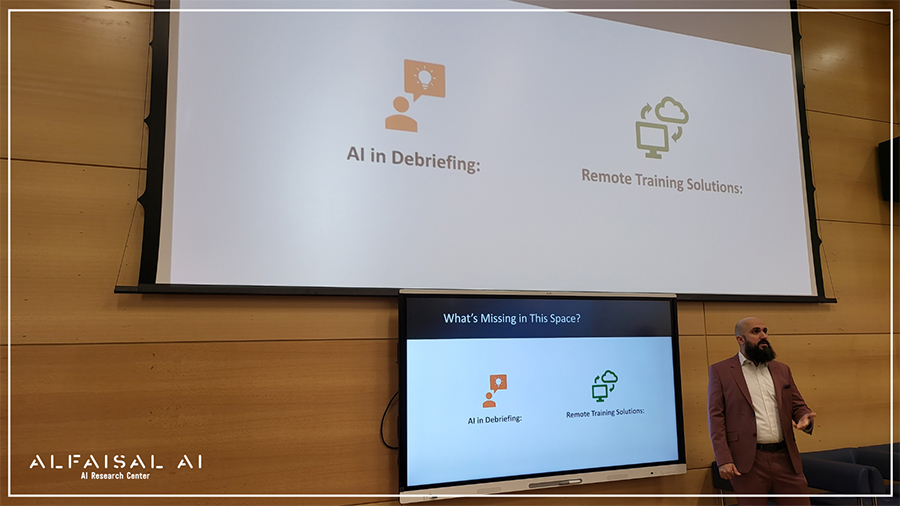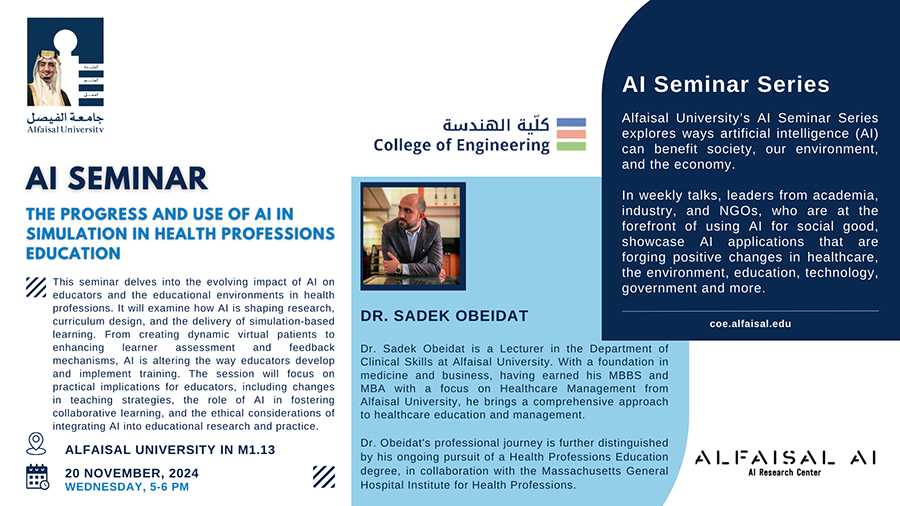Recent advancements in AI and Virtual Reality (VR) technology have opened new frontiers in medical education, igniting interest among medical educators to incorporate it into mainstream curriculum, complementing traditional training modalities such as manikin training. Aligned with the growing interest of educators to explore the potential of AI-enabled VR technology to augment and support the existing medical training modalities, the AI Research Center at Alfaisal University hosted a seminar titled, “The Progress and Use of AI in Simulation in Health Professions Education,” which was presented by Dr. Sadek Obeidat, Lecturer in the Department of Clinical Skills at Alfaisal University’s College of Medicine.
In this seminar, Dr. Sadel Obeidat highlighted how VR-based education has been shown to improve both knowledge and skill acquisition within health professions education and training. He described how emerging VR applications offer immersive and interactive experiences that closely mimic real-world scenarios and have the potential to contribute toward improving learning outcomes for health professions education. In addition to boosting learning efficacy, Dr. Sadek shed light on VR and augmented reality (AR) systems that have demonstrated potential for reducing medical errors by offering immersive, simulation-based training that enhances clinician competence while cutting training costs. He emphasized that virtual technologies create a risk-free environment for trainees to practice in the virtual realm, improving the learning process and reducing reliance on costly physical resources.
Dr. Sadek introduced a VR-based simulation for surgical training and an ongoing study of the utility of a generative AI-enabled VR platform in assessing the non-technical skills of healthcare providers, which goes beyond mere effectiveness to probe more deeply into the utility and the usability of the VR simulator. Although web-based simulations on desktops or tablets provide valuable case studies for learning procedures and honing decision-making skills, VR and AI-enabled simulations offer a distinct advantage. Their key strength lies in creating an immersive environment that not only presents interactive scenarios but also helps users become familiar with actual spatial orientation in clinical contexts.
The seminar concluded with a discussion about the readiness of the current medical curriculum to integrate these emerging technology solutions, as well as the willingness of the students and educators to accept these modalities, which remains uncertain. The audience discussed the trade-offs between hands-on learning in clinical settings and three-dimensional virtual settings that facilitate multi-sensory experiences of VR, with its enhanced realism. To address the limitation of interaction in virtual contexts while still leveraging VR’s advantages, the discussion focused on future explorations of hybrid training models that combine emerging technology’s benefits with the wisdom and adaptability of in-person instruction for health professions. The speaker also highlighted an emerging direction worth exploring for health professions education which includes remote VR training incorporating real-time instructor feedback during the scenario and in debriefing. The use of cloud-based technology could alleviate the need for dedicated physical spaces, and a multi-user login feature could allow instructors to interact with multiple students in a simulated environment. This approach ensures the instructor remains an integral part of the training process.
In closing, the Director of the AI Research Center, Dr. Areej Al-Wabil highlighted, “The integration of AI and VR in health professions education presents a transformative opportunity to enhance learning experiences, improve skill acquisition, and reduce medical errors. While challenges remain in adapting curricula and ensuring widespread acceptance among educators and students, the potential benefits of immersive, simulation-based training are evident. As technology continues to evolve, hybrid models that blend virtual training with hands-on experience may offer the best approach for the future. Alfaisal University’s commitment to exploring these advancements underscores the growing role of AI-driven innovations in shaping the next generation of medical education.”
Alfaisal University’s AI Seminar Series explores ways artificial intelligence (AI) can benefit society, our environment, and the economy. In weekly talks, leaders from academia, industry, and NGOs, who are at the forefront of using AI for social good, showcase AI applications that are forging positive changes in healthcare, the environment, education, technology, government and more. More about the AI Seminar Series can be found at ai.alfaisal.edu.














